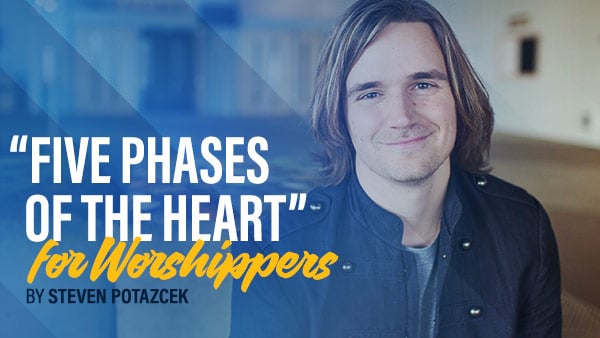
by Steven Potazcek
In 1647, English and Scottish theologians convened to establish The Westminster Confession of Faith. Considered by many Protestants to be the grandest doctrinal statement to come out of the English Reformation, the Confession declares that the chief end of man is “to glorify God, and to enjoy Him for ever.” If we are designing and leading worship effectively, I believe that the end result should be that our community is invited into deeper and deeper waters of intimacy with God. These depths provide the space to “glorify and enjoy Him,” as well as to be transformed personally and corporately.
Are there specific modalities that we as worship leaders can utilize to create this sacred space? Are there some consistent trademarks of a set that lead us into the realms of life-altering worship?
I want to discuss what I’ve heard many worship leaders call the “Five Phases of the Heart,” or five basic phases that exist in worship. Understanding these phases is helpful in our experience of God. As we pass through these phases we are headed toward one goal: intimacy with God.
1. Call To Worship:
People come into our meetings from all sorts of places: joy, sorrow, anxiety, business, etc. More often than not (especially in today’s techno-centric society), people need a wake-up call: a chance to get centered and focused. As worship leaders, we lead the call by crying out, “I am going to intentionally and purposefully choose worship right now. Nothing else is more important.”
If we bypass this opening phase of worship, we risk not only leaving worship passengers at the station on the outside of the heart, but we can actually make people feel alienated from God, wondering why they’re not “getting it” like we are. As leaders, it is our responsibility to gather the Lord’s flock and move out with purpose, as one. The “call to worship” can be either an invitation for us to worship, or an invocation to God to come and “inhabit our praise” (Ps. 22:3).
Song selection for the call to worship is quite important, as this has the potential to set the tone of the entire gathering. A few examples of songs for this phase might be “All Hail the Power of Jesus’ Name,” “Bless His Name,” “Blessed Be the Name,” “Here For You,” the traditional “Doxology,” or “Oh Praise Him.”
Remember, just because we have spent time for weeks preparing this worship set doesn’t mean that the rest of the church is ready to go right out of the gate. No, we call them (and ourselves) to worship.
Does David not declare in the beginning of Psalm 103: Praise the Lord, my soul; all my inmost being, praise his holy name. Praise the Lord, my soul, and forget not all his benefits. Does he not declare in Psalm 57: My heart, O God, is steadfast, my heart is steadfast; I will sing and make music. Awake, my soul! Awake, harp and lyre! I will awaken the dawn. If the only saint known in Scripture as “a man after God’s own heart” needs to be reminded to praise, we might too.
2. Engagement (or Declaration):
As we shift from the call to worship itself, we begin to actually engage with the living God. In this phase, we begin to express adoration, praise, and boldly declare who God is and what He has promised. Being in God’s presence should excite our heart and mind, which calls us to praise Him for who He is and what He is doing.
The heart of worship is to be united with our Creator and with the Church locally, universally, and historically. Remember, worship is going on all the time in heaven. When we worship, we are joining that which is already happening, what has been called the “communion of saints.” Thus, there can be a powerful corporate dynamic.
Pastor John Wimber said that, “an individual may have moments like these in his or her private worship at home, but when the church comes together, the manifest presence of God is magnified and multiplied.” Some examples of songs that stir our hearts to engagement may include “Everlasting God,” “Mighty To Save,” “In Christ Alone,” or “You Never Let Go.” These are songs that praise Him, and tell of His wonderful attributes and promises. As we move further into the engagement phase, we move into more and more personal language. Again, it should be said that if we move too quickly into this phase, we risk alienating folks. Similar to the act of physical intimacy, moving into intimacy with God is a process; it cannot happen too quickly. We must allow sacred space for our hearts to arrive at this point.
Side note: often this intimacy causes us to meditate (even as we are singing) on our relationship with God. Sometimes we recall vows we have made, sins we are actively involved in, or disappointments we are experiencing. Tears may result as we see our disharmony and His harmony; our limitations and His unlimited possibilities. This phase, in which we have been wakened to His presence, can and should result in a deeper level of personal and corporate expression.
3. Expression:
Worship that only focuses on God’s attributes or what He has done bears little personal engagement and leaves us at the shallow end of relationship. Deep, personal worship should bring us to a place of honest, vulnerable, and intimate engagement. This requires some form of expression! A cursory look at a few of the Hebraic, Aramaic, and Greek definitions of “worship” reveal active physical and emotional expression:
- Shachah (Shaw-khaw) Hebrew: To bow down, do homage, be down, to prostrate. (Genesis 18:2, Exodus 4:31, Leviticus 26:1)
- Segid (Seg-eed) Aramaic: Pay homage to, bend down, bow, stoop low (Daniel 3:5-15, 3:28)
- Proskuneo (Pros-koo-neh-O) Greek: Most prevalent New Testament word for worship: to turn toward and kiss or come close to and kiss; to reverence, worship, to prostrate oneself, adore on one’s knees. (Matthew 2:2, Luke 4:8, John 4:20-24, Revelation 4:10, 19:10, 22:9)
Any notion that deep worship should not involve creative ways of saying “I love you” to God is not only shallow and separated from the heart, but is downright un-Biblical. This is not to prescribe specific action necessarily (raising hands, shouting, whatever), but to say that true worship involves “body, soul, mind, and strength” (Matthew 22:37).
As we live in the Western world, we must be aware that our culture is one where people often struggle to express themselves for fear of “standing out,” “looking stupid,” or “being rejected.”
A part of our responsibility as worship leaders is to lovingly shepherd our people into these moments of expression, providing the sacred, safe atmosphere for them to let go and enter into deeper levels of engagement. A few examples of expressive songs could include “How He Loves,” “Breathe,” “Forever Reign,” and “I Love Your Presence.” Expression then moves to a zenith, a climatic point: we have expressed what is in our hearts and minds and bodies, and now it is time to wait for God to respond. We wait for him to speak, to move.
4. Visitation:
The almighty God visits his people. Sometimes the visitation is palpable, almost tangible. The Hebrews spoke of this type of visitation as the kabode of God, the “heavy, weighty, splendor, abundance and copiousness” of God. It is the light of God, the majesty of God, the greatness of God. To be clear, we do not worship in order to gain His presence; He is worthy to be worshiped whether or not we experience anything. But as mentioned earlier, God “dwells in the praises of his people.” We should always come to worship prepared for an audience with the King. And we should expect the Spirit of God to work among us. It is important that we consistently allow the space for God to visit and speak to us. This could be through silence, it could be a break in the lyrics for a while, it could be purposeful transitions, it could be selecting a song that actually allows this space. There are no rules here! An awareness of and expectation for God’s presence though, should be on our radars whenever we lead.
5. Giving of Substance:
Ministry is a life of giving. We must live lives of surrender and availability. In other words, God should have ownership of everything. Remember, whatever we give God control of, He can multiply and bless. Often, God will call us to give something when we don’t have any of it (whether it is money, love, hospitality, or information)! Whatever God wants to give through us, He first has to do to us. We are the first partakers of the fruit. But we are not to eat the seed. We are to sow it, to give it away. The underlying premise is that whatever we are is multiplied, for good or for bad.
Whatever we have on our tree is what we are going to get in our orchard. Giving is the natural response of a heart that has been given to. Some song selections for this might be “Take My Life and Let It Be,” “I Surrender All,” “From the Inside Out,” and “We Fall Down.”
In summation, while every worship set does not necessarily have the follow a script, it is vital that we as worship leaders recognize the natural order of progression that the heart typically goes through. Creative planning and “thinking the progression through” ahead of time only allows more freedom for the Holy Spirit to move and empower our offerings!
With heart,
Steven Potaczek
Steven and Amanda Potaczek are worship leaders, band-mates, parents, award-winning songwriters, and adjunct faculty in the music business department at Anderson University--but not necessarily in that order. They are in the midst of helping to plant Hope City Church (hopecityindy.cc) in Indianapolis as Creative Arts Pastors. Steven can be contacted via email.
For more helpful articles about developing a theology of worship, go to www.discoverworship.com.









